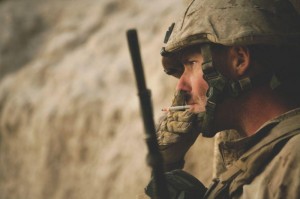
U.S. Marine Corps Sgt. Deacon Holten, a squad leader with 2nd Battalion, 8th Marine Regiment, smokes a cigarette after an attack at Patrol Base Bracha in the Garmsir district of Helmand province, Afghanistan, Oct. 9, 2009. (Photo courtesy of U.S. Marine Corps)
Although quitting tobacco may be at the bottom of the list of priorities for wounded, ill and injured Service members and their families and caregivers, they should speak with their physicians about how quitting can help in recovery and rehabilitation.
Health benefits
For example, the positive effects from quitting smoking start almost immediately. According to the National Cancer Institute, some of the benefits include:
- Heart rate and blood pressure, which are abnormally high while smoking, begin to return to normal
- Within a few hours, the level of carbon monoxide in the blood begins to decline, allowing blood to carry oxygen more effectively
- Within a few weeks, people have improved circulation, produce less phlegm, and don’t cough or wheeze as often
- Within several months, people can expect substantial improvements in lung function
Treatments
Wounded warriors and their families have increased levels of stress that may make quitting an addictive substance such as tobacco especially difficult. However, there are many effective treatments and resources available to reach a healthier, tobacco-free life. From nicotine patches and gum to massage therapy, wounded warriors can work with their physician on an approach to overcome nicotine addiction. According to the Centers for Disease Control and Prevention, experts agree that smokers may have to try a number of different methods or a combination of treatments to find the ones that work best.
There are a variety of FDA-approved cessation therapies that may be covered by TRICARE to help smokers quell the desire to light up. The TRICARE Tobacco Cessation Program covers most inpatient and outpatient care that is medically necessary and considered proven. These may include:
- Medication therapy can ease withdrawal symptoms and reduce cravings, and is most effective when used as part of a comprehensive stop-smoking program monitored by a physician
- Nicotine replacement therapy involves “replacing” cigarettes with other nicotine substitutes, such as nicotine gum or a patch, to relieve some of the withdrawal symptoms without the tars and poisonous gases
- Non-nicotine medication helps smokers by reducing cravings and withdrawal symptoms without the use of nicotine
- Hypnosis, a non-medication therapy, gets the smoker into a deeply relaxed state where he or she is open to suggestions that strengthen the resolve to quit smoking and increase negative feelings toward cigarettes
- Another non-medication therapy, acupuncture, is believed to work by triggering the release of endorphins (natural pain relievers) that allow the body to relax and help in managing withdrawal symptoms
- Behavioral therapy focuses on learning new coping skills and breaking ritualistic habits associated with smoking
- Motivational therapies can provide a number of ways to encourage smokers to kick the habit, such as calculating the monetary savings
Resources
In continuing the Total Force Fitness coverage this month, the Department of Defense (DoD) and the Military Health System encourage healthy behavioral choices such as quitting tobacco to benefit the health of Service members and their loved ones.
The DoD “Quit Tobacco—Make Everyone Proud” program offers information and tips, alongside counseling, hotlines, forums and other tools for Service members and veterans enrolled in Veterans Affairs care system. It also offers assistance and support to anyone who may have a loved one who smokes, dips or uses snuff. The DoD is committed to reducing the use of tobacco in the defense community and improving the health and wellbeing of the force, their families and the wider defense community. For more information, call TRICARE®’s toll-free Smoking Quitline, available 24 hours a day, 7 days a week, including weekends and holidays:
- North Region: 866–459–8766
- South Region: 877–414–9949
- West Region: 866–244–6870
For 24/7 help with substance abuse, call 800-342-9647 or visit MilitaryOneSource.com. For more resources, visit the National Resource Directory.